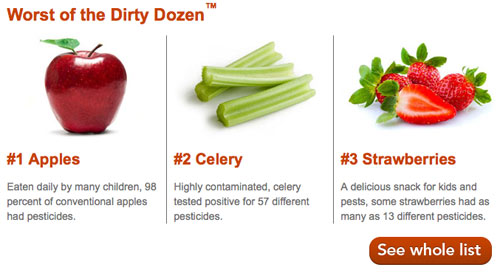I have been buying a mix of organic and non-organic fruits and vegetables for years. To be completely honest I think I probably was a bit heavier with the non-organics (less expensive and pretty). I shuddered as I typed that. I’m happy to report that my buying habits have changed. I try to make sure all the fruits and vegetables that I buy are organic. The change has coincided directly with my growing knowledge and understanding of food and nutrition.
If I don’t understand WHY I’m doing something I’m not fully committed and I’ll only do it for so long. That used to be my relationship with organic food. I had been told that organic foods were good for me. They didn’t have chemicals or pesticides. I really didn’t understand how bad the chemicals and pesticides were. I mean, as far as I understood it they were regulated by the government so they couldn’t be all that bad. Scary.
When I started cooking and got rid of all the processed foods I started buying organic. It seemed to make sense and it’s pretty easy to buy organic these days so, why not. That was back in April of 2011. Since then I have read a LOT. I have also started my Masters program in Holistic Nutrition. I am finally understanding WHY organic foods are so important. Now I really won’t buy anything that isn’t organic.
Here’s my bullet list of why conventional foods are really bad:
- The chemicals and Pesticides used in agriculture are designed to be toxic. They kill insects, weeds, fungus, rodents and other pests (why wouldn’t they kill us).
- It is estimated that over 75 million birds die every year because of pesticides (again, if they kill birds I’m sure they can kill us).
- The Environmental Protection Agency admits that less than 45% of the chemicals used today have reliable toxicity data
- Studies done on these chemicals to determine what is safe are done for adults not children (children have less developed metabolisms and organs).
- The human body needs 60 different vitamins and minerals.
- Conventionally farmed soil is devoid of nutrients. They add only 3 (nitrogen, phosphate & potassium) of 60 the body needs back into the depleted soil.
- We don’t get the vitamins and minerals we need from conventional foods. The food isn’t getting it from the soil so we aren’t getting it from the food.
The Environmental Working Group has a great website. FoodNews.org. On the site you will find fruits and vegetables ranked in order of toxicity. The image below is from the front page of FoodNews.org. A little taste of what you will find on the site.
Now here is my bullet list for why WE SHOULD EAT ORGANIC foods:
- Organic farming methods replenish the nutrients back into the soil through organic matter. By eating organic foods grown in healthy soil we get the nutrients our bodies need.
- Organic farming is sustainable. The food is more nutritious and it taste great.
- There are no chemicals or pesticides.
- The more demand we create for organic, healthy, sustainable foods the more available they will become (we are already seeing this happen).
O.k., so I’m feeling pretty comfortable with organic foods. The two new things I’m trying to incorporate are local and seasonal. Again, something I didn’t really understand the benefits of. This is one of the first things that I learned in my holistic nutrition program. Love it!
Why buy local? There are beautiful, delicious organic fruits and vegetables available to me from all over the world.
- Support your local farmer (CSA & Farmer’s Markets)
- Phytochemicals also known as Pytonutrients
- Local will be seasonally appropriate, good for the body
- Less trucking/shipping so less fuel
Phytochemicals/Phytonutrients
I have to admit I didn’t know what these were. Never heard of them. Well, they are really good for us and they are found in plant foods. The longer the plant remains on the vine the more phytochemicals it will possess and pass on to us. Local fruits and vegetables will more than likely be on the vine the longest. Sometimes fruits and vegetables at farmers markets are picked that very day. Plant foods that are shipped from other parts of the world are more than likely picked early and chemically ripened.
Plant foods have always been considered healthy because of their vitamins, minerals and fiber. As it turns out, plant foods contain thousands of other compounds. Scientists refer to these compounds collectively as Phytochemicals or Phytonutrients. In the last 30 years hundreds of Phytonutrients have been identified. It’s estimated that there may be up to 40,000 phytonutrients. Research is being done to identify the health benefits of these compounds. A good example of a possible health benefit is a phytonutrients ability to act as an antioxidant. Antioxidant is a term I recognize. I want antioxidants in my diet. The more I get the better. Buying local produce seems like an easy way to make sure I’m getting as many phytonutrients as I can. The more the better.
Seasonal Plant Foods
This is hard for me. I love strawberries in the middle of winter! I don’t live in an area that grows strawberries in the middle of winter. Actually, the area that I live in doesn’t grow ANYTHING in the winter. This is a problem for a lot of people in the United States. During the winter months many of us have to look to our closest regional neighbor for “local” produce. I’m kind of in the middle so I’ll probably look for fruits and vegetables from Florida and California. In the past I just grabbed stuff from anywhere. I never gave proximity a thought. Dumb.
The toughest part for me is going to be passing up the strawberries because they really aren’t a winter fruit. I really want to focus on what is in season. Things might get grim during January, February and March. I’m going to try and stay strong and learn to cook things I probably haven’t cooked before. Any ideas would be greatly appreciated.
Here is some additional reading from the Environmental Working Group:
- Report Urges Ban on Dangerous Insecticides – talks about the exposure to kids. “Foods that cause the most children age 5 and under to exceed a safe daily dose of OP pesticides are apples, peaches and grapes”.
- Overexposed | Organophosphate Insecticides (OP) in Children’s Food – talks about the potential for long term brain and nerve damage.
- EWG’s Shopper’s Guide to Pesticides in Produce: Dirty Dozen and Clean 15
- Frequently Asked Questions about Produce and Pesticides from EWG.
Sorry, kind of a bummer but it’s always good to be informed.
Simplify, Eat Well and Feel Good

I’m Amy a board certified holistic nutritionist, certified functional nutritionist and lifestyle practitioner and certified Life Coach. I help women in midlife understand the changing needs of their body so that they can stop dieting and lose weight permanently. At 56 I live what I teach. Don’t believe the story that your best years are behind you. They are not. Your best years are just starting!

